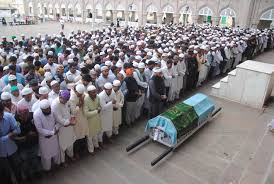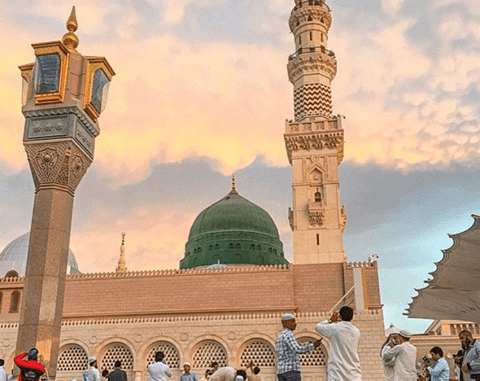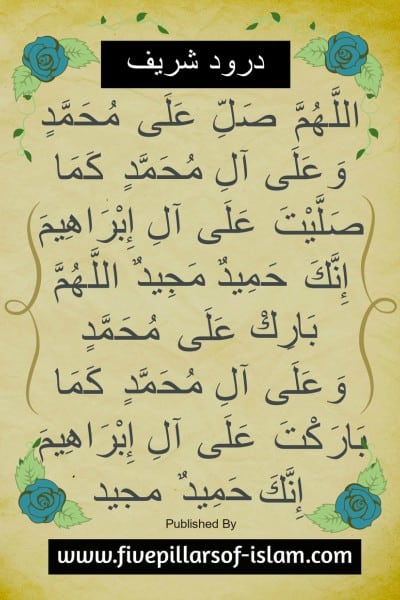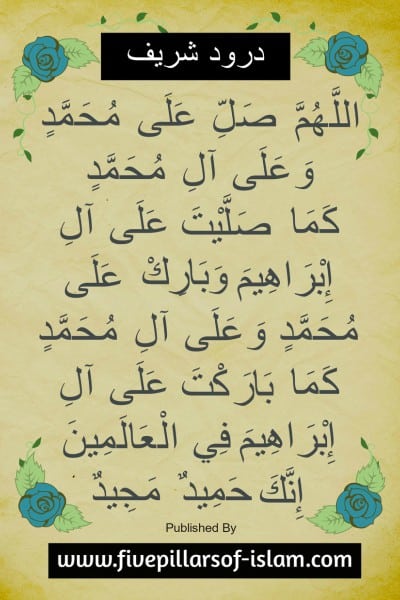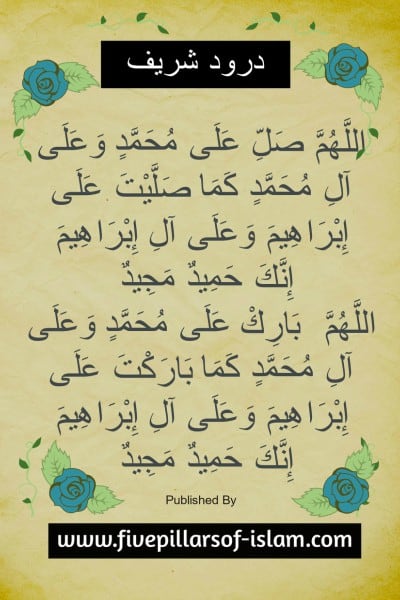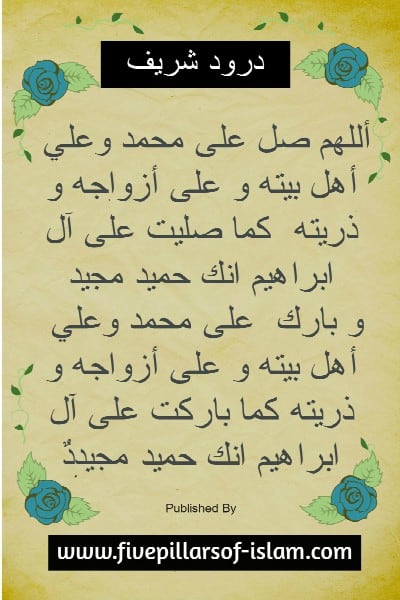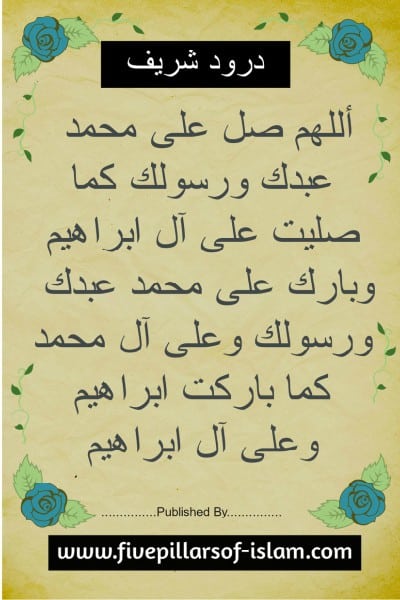Syed Maulana Abul Hasan Ali Mian Nadwi: Former President All India Muslim Personal Law Board: He is a glorious Islamic scholar, author, a thinker, eminent writer, preacher, moderator, and patron of Darul Uloom Nadwat Ulema Lucknow, member of Muslim World League Makkah and Madinah Munawwara University, the President of the All India Muslim Personal Law Board and the son of Maulana Hakeem Syed Abdul Hai, Rai Barelvi (author of Nuzhat Al-Khawatir)
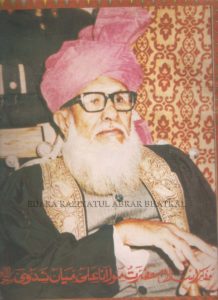
Abul Hasan Ali Mian Nadwi
Birth :
He was born happily on 6th Muharram 1332 AH, on 5th December 1914, outside the city of Rai Bareli. His father’s name was Hazrat Maulana Syed Abdul Hai, who was a great religious scholar, historian, and writer of the time. He belonged to the world-famous family of Syed Ahmed Shaheed Rai Barelwi.
Education and Training :
He started his early education at home. He read the Holy Quran and some books of Urdu and Persian language under the supervision of his mother.
When he was nine years old, his father passed away.
then he received his all education from his elder brother Hazrat Maulana Dr. Syed Abdul Ali Hasani Sahib (Fazil Deoband), who was twenty years older than him,
He started Arabic and English at the age of ten, learned Arabic from Sheikh Khalil bin Muhammad Ansari Yamani. He later acquired Arabic literature from Sheikh Taqi-ud-Din al Hilali of Morocco, who was a teacher of Arabic literature at Darul Uloom Nadwat Ulema Lucknow at that time.
In Urdu literature, he studied from some of his family’s dear ones, especially Maulana Abul Khair Sahib Barq.
In 1927, he went to the Department of Arabic at the University of Lucknow and obtained a degree in Arabic Language and Literature.
During the period of 1928 to 1930s, he developed his English language skills.
In 1929, he went to Darul Uloom Nadwat Ulema and completed the stages of acquiring various sciences and arts.
In 1932, he stayed in Darul Uloom Deoband for several months and read Bukhari Sharif and Tirmidhi Sharif from Shaykh-ul-Islam Hazrat Maulana Syed Hussain Ahmad Sahib Madani. On this occasion, he used Shaykh-ul-Adab Hazrat Maulana Aizaz Ali Sahib Amrohi in jurisprudence and according to Hafs tradition he benefited from Qari Asghar Ali Sahib in the art of Tajweed.
He also traveled to Lahore, Pakistan to study Tafsir, where he read Tafsir from Shaykh-ul-Tafsir Hazrat Maulana Ahmad Ali Sahib Lahore.
Teaching, organization, and awards:
Hazrat Maulana Syed Abul Hassan Ali Mian Nadwi is the great scholar and literary personality of the Islamic world whose scholarly and literary research and authorship services and the iron of greatness were considered in the Arab and non-Arab world.
Every aspect of his personality is full of charm and beauty.
His religious, scholarly, social, and linguistic services are of immense importance and breadth.
For almost a century, he impressed especially the Indian subcontinent and the world in general with his charming personality, and it is safe to say that he was popular and respected throughout the Islamic world. He came to the part of very few people.
In recognition of his scholarly and literary services, he has been awarded great honors and awards.
He visited countless countries. Apart from the scholarly and literary personalities of every country he visited, the heads of state also consider meeting him as a source of pride and happiness for them.
He was a member and patron of dozens of international organizations and well-known institutes, including the Muslim world league.
- In 1934, he was appointed as a teacher of Tafsir, Hadith, and Arabic Literature in Darul Uloom Nadwatul ulama Lucknow.
- In 1935, he started his mission by inviting Dr. Bhimrao Ambedkar to Islam.
- In 1939, he visited the whole subcontinent and got information about those who work in the field of Da’wah of Islam and the promotion of Islam. In this regard, while meeting various preachers and educators of the religion, there was also a meeting with the Islamic thought poet of the time, Dr. Muhammad Iqbal Sahib. (also known as allama iqbal)
- In 1948, he launched the magazine “Taamir” which is now being published as “Taamir e Hayat”.
- In 1949, on the proposal of Hazrat Allama Syed Sulaiman Nadvi Sahib, he was made Deputy Commissioner of Education in Nadwat Ulema then, in 1950, he became the regular Commissioner of Education.
- In 1959, he set up an organization in Lucknow called Majlis e Tahqeeqat o Nashriyat e Islam (the Research and Broadcasting Council of Islam).
- After the death of his elder brother, in 1961, he was elected as Nazim of Darul Uloom Nadwat Ulema.
- When the University of Madinah was founded in 1962, he was elected as a founding member of its advisory board and in the same year, he became a member of the advisory board (Shura of Darul Uloom) Deoband.
- In 1974, he launched a movement as Payam e Insaniyat (the Message of Humanity).
- In 1980, he received the Shah Faisal Award and dedicated the entire amount of this award to the Afghan Refugees, Jamaat-e-Tahafiz-ul-Quran and Madrasa Solatiya Makkah Mukarramah.
- In 1981, the University of Kashmir conferred the honorary degree of D.Litt.
- In 1982, he was elected the President of the All India Muslim Personal Law Board.
The key of the Kaaba was presented in 1996 and the door of Kaaba was opened by him.
His greatest achievement is that he had made Darul Uloom Nadwat Ulema Lucknow a renowned and international university through his struggle, where thousands of students are being studied both the religious and economical books.
The second is that he has written, compiled, authored, and translated thousands of books on every subject, on every issue, whether it would be scientific or literary, political or social, religious or cultural.
The number of his major and minor compositions is 199 in the Arabic language.
The number of his major and minor compositions is 304 in the Urdu language.
Some of His famous books are:
المسلمون فی الھند ، رسالۃ التوحید ، الطریق الی المدینۃ المنورہ ، العرب والاسلام ، القراۃ الراشدہ ( تین حصے ) قصص النبیین (پانچ حصے) مختارات (دو حصے) سیرت سید احمد شھیدؒ ، پرانے چراغ ، النبی الخاتم صلی اللہ علیہ وسلم ، روائع اقبال ، حضرت مولانا محمد الیاسؒ اور ان کی دینی دعوت ، تاریخ دعوت و عزیمت ، سوانح حضرت مولانا شاہ عبد القادر رائپوریؒ ، تذکرہ حضرت مولانا شاہ فضلِ رحمن گنج مرادآبادیؒ ، اسلامی تہذیب ، شرق اوسط کی ڈائری ، جب ایمان کی باد بہار چلی ، ارکان اربعہ ، پاجا سراغ زندگی ، اسلامیت و مغربیت کی کشمش ، دستور حیات اور مسلمانوں کے عروج و زوال کا اثر
Muslims in India, Message of Tawheed, The Way to Madinah Al-Munawarah, Al-Arab and Islam, Al-qirat Al-Rashidah (Three Parts), Stories of the Prophets (Five Parts), Mukhtarat (Two Parts), Hazrat Maulana Muhammad Ilyas and His Religious Da’wah, History of Da’wah and Dignity, Biography of Hazrat Maulana Shah Abdul Qadir Raipuri, Mention of Hazrat Maulana Shah Fazl Rehman Ganj Muradabadi, Islamic Civilization, Pa ja Suragh e Zindagi, Islamism and Maghribism, Constitution of life and Influence of Rising and Falling of Muslims
The books are still alive and the benefit of such Excellent books will continuously reach the Ummah and humanity too till the Day of Resurrection. In sha Allah
Positions, ranks, and honors:
- Nazim Nadwat Ulema Lucknow,
- Founding Member of the Islamic World of Makkah
- President and Founder of International council of Islamic Literature,
- President of Majlis-e-ilmi Lucknow,
- President Religious Education Council Uttar Pradesh,
- President All India Muslim Personal Law Board,
- President Darul Musannifin Academy Azamgarh,
- President Oxford Center for Islamic Studies,
- Member of Majlis Shura Darul Uloom Deoband,
- Member of the Committee of the Islamic University, Rabat, Morocco,
- Member of the Majlis-e-Shura, Jamia Alamia, Islamabad,
- Member of the Arabic Language Council of Damascus,
- Member of the Council of the Arabic Language Cairo,
- Member of the Council of the Arabic Language of Jordan,
- Member of the Royal Academy for the Study of Islamic Civilization, Al-Bayt Institute Jordan
- Honorary Doctorate Degree in Literature from Kashmir University, 1981
- Faisal Award for Islamic Service, 1980
- Award for Outstanding Islamic Personality, Dubai.
Died:
On the 22nd of Ramadan 1420 AH, before the Friday prayers of 31st December, 1999, at 11:55 AM, at the age of 86 years, while reciting the Holy Quran in his hometown Takiya Kalan, Shah Alamullah Rai Bareilly, he met the real owner.
Hazrat Maulana Syed Mohammad Rabey Hasni Nadvi Sahib led the funeral prayer. His grave (qabr) is in the East side of Masjid Takiya Kalan, Rai Bareli. According to the police, there were about two lacs people in the last funeral prayer.
We belong to Allah and we shall return to Him.
- Born: 5 December 1913, Raebareli
- Day of death: December 31, 1999, 22nd Ramdan 1420
- Parents: Hakim Syed Abdul Hai
- Award: King Faisal Prize (1980)
- Alma mater: Darul-uloom Nadwatul Ulama
- Movement: Islamism-Modernism
Related Tags: Abul Hasan Ali nadwi books pdf
Abul Hasan Ali nadwi quotes
Abul Hasan Ali nadwi english books
Abul Hasan Ali nadwi arabic books
maulana abul hasan ali nadwi biography
Muslims in India abul hasan ali nadwi
Abul Hasan Ali nadwi biography in urdu
Abul Hasan Ali nadwi archive Indian author
